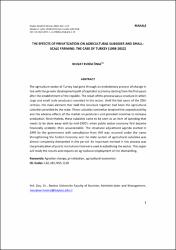| dc.contributor.author | Önal, Nevzat Evrim | |
| dc.date.accessioned | 2021-03-11T20:13:21Z | |
| dc.date.available | 2021-03-11T20:13:21Z | |
| dc.date.issued | 2016 | |
| dc.identifier.issn | 2147-8082 | |
| dc.identifier.issn | 2651-5393 | |
| dc.identifier.uri | https://app.trdizin.gov.tr/makale/TWpVek5USTNOdz09 | |
| dc.identifier.uri | https://hdl.handle.net/20.500.12879/19 | |
| dc.description.abstract | Türkiye'nin tarım sektörü cumhuriyetin ilk yıllarından itibaren kapitalist ekonominin gelişme doğrultusuna uygun, evrimsel bir dönüşüm geçirmiş ve bu dönüşüm çerçevesinde büyük toprak sahipleri ile küçük üreticilerin bir arada var olduğu bir yapı ortaya çıkmıştır. 20. yüzyılın son yıllarına dek bu yapının, onu bir arada tutan en önemli unsuru, devletin tarım sektörüne verdiği sübvansiyonlardı. Bu sübvansiyonlar, küçük üreticiler üzerinde piyasanın olumsuz etkilerini ve öngörülemezliğini bir ölçüde azaltmakta ve üretimi teşvik eder nitelikteydi. Ne var ki, 1990'ların ortasından itibaren finansal açıdan önce istikrarsız, ardından da sürdürülemez hale gelen kamu kesimi ekonomisinde, tarımsal destekler ortadan kaldırılması gereken bir harcama kalemi olarak öne çıktı. 1999'da IMF danışmanlığında başlatılan yapısal uyum programı, 2001 krizinin ardından Güçlü Ekonomiye Geçiş Programı olarak sürdürüldü ve bu süreçte devletin tarımsal destek sistemi büyük ölçüde tasfiye edildi. Bu tasfiyede, tarımsal desteklerin sağlanmasında kullanılan kurumların özelleştirilmesi önemli bir yöntem olarak öne çıktı. Bu çalışma, yaşanan tasfiyenin tarım sektöründeki sonuçları ve tarımsal istihdama etkilerini incelemektedir. | en_US |
| dc.description.abstract | The agriculture sector of Turkey had gone through an evolutionary process of change in line with the general development path of capitalist economy starting from the first years after the establishment of the republic. The result of this process was a structure in which large and small scale producers coexisted in the sector. Until the last years of the 20th century, the main element that held this structure together had been the agricultural subsidies provided by the state. These subsidies somewhat lessened the unpredictability and the adverse effects of the market on producers and provided incentive to increase production. Nevertheless, these subsidies came to be seen as an item of spending that needs to be done away with by mid-1990's when public sector economy first became financially unstable, then unsustainable. The structural adjustment agenda started in 1999 by the government with consultation from IMF was resumed under the name Strengthening the Turkish Economy and the state system of agricultural subsidies was almost completely dismantled in this period. An important method in this process was the privatization of public institutions that were used in subsidizing the sector. This paper will study the results and impacts on agricultural employment of this dismantling. | en_US |
| dc.language.iso | tur | en_US |
| dc.rights | info:eu-repo/semantics/openAccess | en_US |
| dc.subject | [Anahtar Kelime Yok] | en_US |
| dc.title | Özelleştirmenin Tarımsal Destekler Ve Küçük Ölçekli Çiftçilik Üzerine Etkileri: Türkiye Deneyimi (1998-2012) | en_US |
| dc.title.alternative | The Effects Of Privatization On Agricultural Subsidies And Small- Scale Farming: The Case Of Turkey | en_US |
| dc.type | article | en_US |
| dc.contributor.department | Beykoz Üniversitesi Mühendislik ve Mimarlık Fakültesi | en_US |
| dc.contributor.institutionauthor | Önal, Nevzat Evrim | |
| dc.identifier.volume | 4 | en_US |
| dc.identifier.issue | 2 | en_US |
| dc.identifier.startpage | 1 | en_US |
| dc.identifier.endpage | 19 | en_US |
| dc.relation.journal | Beykoz Akademi Dergisi | en_US |
| dc.relation.publicationcategory | Makale - Ulusal Hakemli Dergi - Kurum Öğretim Elemanı | en_US |


















